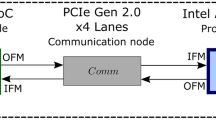Abstract
Deep Neural Networks (DNNs) are currently making their way into a broad range of applications. While until recently they were mainly executed on high-performance computers, they are now also increasingly found in hardware platforms of edge applications. In order to meet the constantly changing demands, deployment of embedded Field Programmable Gate Arrays (FPGAs) is particularly suitable. Despite the tremendous advantage of high flexibility, embedded FPGAs are usually resource-constrained as they require more area than comparable Application-Specific Integrated Circuits (ASICs). Consequently, co-execution of a DNN on multiple platforms with dedicated partitioning is beneficial. Typical systems consist of FPGAs and Graphics Processing Units (GPUs). Combining the advantages of these platforms while keeping the communication overhead low is a promising way to meet the increasing requirements.
In this paper, we present an automated approach to efficiently partition DNN inference between an embedded FPGA and a GPU-based central compute platform. Our toolchain focuses on the limited hardware resources available on the embedded FPGA and the link bandwidth required to send intermediate results to the GPU. Thereby, it automatically searches for an optimal partitioning point which maximizes the hardware utilization while ensuring low bus load.
For a low-complexity DNN, we are able to identify optimal partitioning points for three different prototyping platforms. On a Xilinx ZCU104, we achieve a 50% reduction of the required link bandwidth between the FPGA and GPU compared to maximizing the number of layers executed on the embedded FPGA, while hardware utilization on the FPGA is only reduced by 7.88% and 6.38%, respectively, depending on the use of DSPs and BRAMs on the FPGA.
Access this chapter
Tax calculation will be finalised at checkout
Purchases are for personal use only
Similar content being viewed by others
References
Alonso, T., et al.: Elastic-DF: scaling performance of DNN inference in FPGA clouds through automatic partitioning. ACM Trans. Reconfigurable Technol. Syst. 15(2), 1–34 (2021). https://doi.org/10.1145/3470567
Asfour, T., et al.: ARMAR-6: a high-performance humanoid for human-robot collaboration in real-world scenarios. IEEE Robot. Autom. Mag. 26(4), 108–121 (2019). https://doi.org/10.1109/MRA.2019.2941246
Blott, M., et al.: FINN-R: an end-to-end deep-learning framework for fast exploration of quantized neural networks. ACM Trans. Reconfigurable Technol. Syst. 11(3), 1–23 (2018). https://doi.org/10.1145/3242897
Cheng, Q., Wen, M., Shen, J., Wang, D., Zhang, C.: Towards a deep-pipelined architecture for accelerating deep GCN on a Multi-FPGA platform. In: Qiu, M. (ed.) ICA3PP 2020. LNCS, vol. 12452, pp. 528–547. Springer, Cham (2020). https://doi.org/10.1007/978-3-030-60245-1_36
Han, S., Pool, J., Tran, J., Dally, W.J.: Learning both weights and connections for efficient neural networks. arXiv:1506.02626 [cs], October 2015
Howard, A.G., et al.: MobileNets: efficient convolutional neural networks for mobile vision applications (2017). https://doi.org/10.48550/ARXIV.1704.04861, https://arxiv.org/abs/1704.04861
Hu, C., Bao, W., Wang, D., Liu, F.: Dynamic adaptive DNN surgery for inference acceleration on the edge. In: IEEE INFOCOM 2019 - IEEE Conference on Computer Communications, pp. 1423–1431 (2019). https://doi.org/10.1109/INFOCOM.2019.8737614
Hubara, I., Courbariaux, M., Soudry, D., El-Yaniv, R., Bengio, Y.: Quantized neural networks: training neural networks with low precision weights and activations. arXiv:1609.07061 [cs], September 2016
Jiang, W., et al.: Achieving super-linear speedup across multi-FPGA for real-time DNN inference. ACM Trans. Embed. Comput. Syst. 18(5s), 1–23 (2019). https://doi.org/10.1145/3358192
Ko, J.H., Na, T., Amir, M.F., Mukhopadhyay, S.: Edge-host partitioning of deep neural networks with feature space encoding for resource-constrained internet-of-things platforms. In: 2018 15th IEEE International Conference on Advanced Video and Signal Based Surveillance (AVSS), pp. 1–6 (2018). https://doi.org/10.1109/AVSS.2018.8639121
Kreß, F., et al.: Hardware-aware partitioning of convolutional neural network inference for embedded AI applications. In: 2022 18th International Conference on Distributed Computing in Sensor Systems (DCOSS), pp. 133–140 (2022). https://doi.org/10.1109/DCOSS54816.2022.00034
Kwon, D., Hur, S., Jang, H., Nurvitadhi, E., Kim, J.: Scalable multi-FPGA acceleration for large RNNs with full parallelism levels. In: 2020 57th ACM/IEEE Design Automation Conference (DAC), pp. 1–6 (2020). https://doi.org/10.1109/DAC18072.2020.9218528
Mittal, S.: A survey of FPGA-based accelerators for convolutional neural networks. Neural Comput. Appl. 32(4), 1109–1139 (2020). https://doi.org/10.1007/s00521-018-3761-1
Mohammed, T., Joe-Wong, C., Babbar, R., Francesco, M.D.: Distributed inference acceleration with adaptive DNN partitioning and offloading. In: IEEE INFOCOM 2020 - IEEE Conference on Computer Communications, pp. 854–863 (2020). https://doi.org/10.1109/INFOCOM41043.2020.9155237
Pappalardo, A.: Xilinx/brevitas (2021). https://doi.org/10.5281/zenodo.3333552
Teerapittayanon, S., McDanel, B., Kung, H.: Distributed deep neural networks over the cloud, the edge and end devices. In: 2017 IEEE 37th International Conference on Distributed Computing Systems (ICDCS), pp. 328–339 (2017). https://doi.org/10.1109/ICDCS.2017.226
Walter, I., et al.: Embedded face recognition for personalized services in the assistive robotics. In: Machine Learning and Principles and Practice of Knowledge Discovery in Databases, ECML PKDD 2021. CCIS, vol. 1524, pp. 339–350. Springer, Cham (2021). https://doi.org/10.1007/978-3-030-93736-2_26
Zhang, W., Zhang, J., Shen, M., Luo, G., Xiao, N.: An efficient mapping approach to large-scale DNNs on multi-FPGA architectures. In: 2019 Design, Automation & Test in Europe Conference & Exhibition (DATE), pp. 1241–1244 (2019). https://doi.org/10.23919/DATE.2019.8715174
Acknowledgment
This work has been supported by the project “Stay young with robots” (JuBot). The JuBot project was made possible by funding from the Carl Zeiss Foundation. The responsibility for the content of this publication lies with the authors.
Author information
Authors and Affiliations
Corresponding author
Editor information
Editors and Affiliations
Rights and permissions
Copyright information
© 2023 The Author(s), under exclusive license to Springer Nature Switzerland AG
About this paper
Cite this paper
Kreß, F. et al. (2023). Automated Search for Deep Neural Network Inference Partitioning on Embedded FPGA. In: Koprinska, I., et al. Machine Learning and Principles and Practice of Knowledge Discovery in Databases. ECML PKDD 2022. Communications in Computer and Information Science, vol 1752. Springer, Cham. https://doi.org/10.1007/978-3-031-23618-1_37
Download citation
DOI: https://doi.org/10.1007/978-3-031-23618-1_37
Published:
Publisher Name: Springer, Cham
Print ISBN: 978-3-031-23617-4
Online ISBN: 978-3-031-23618-1
eBook Packages: Computer ScienceComputer Science (R0)





